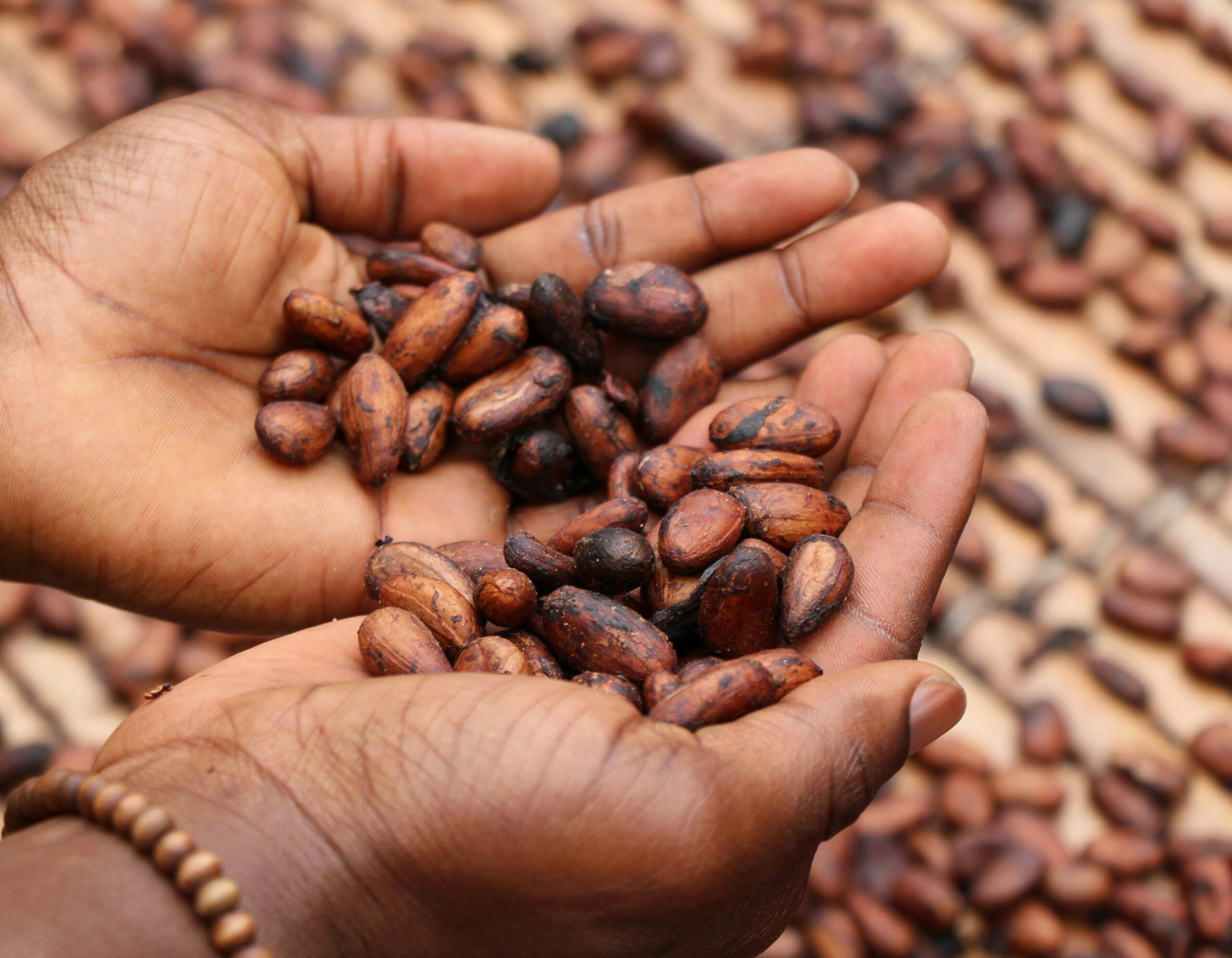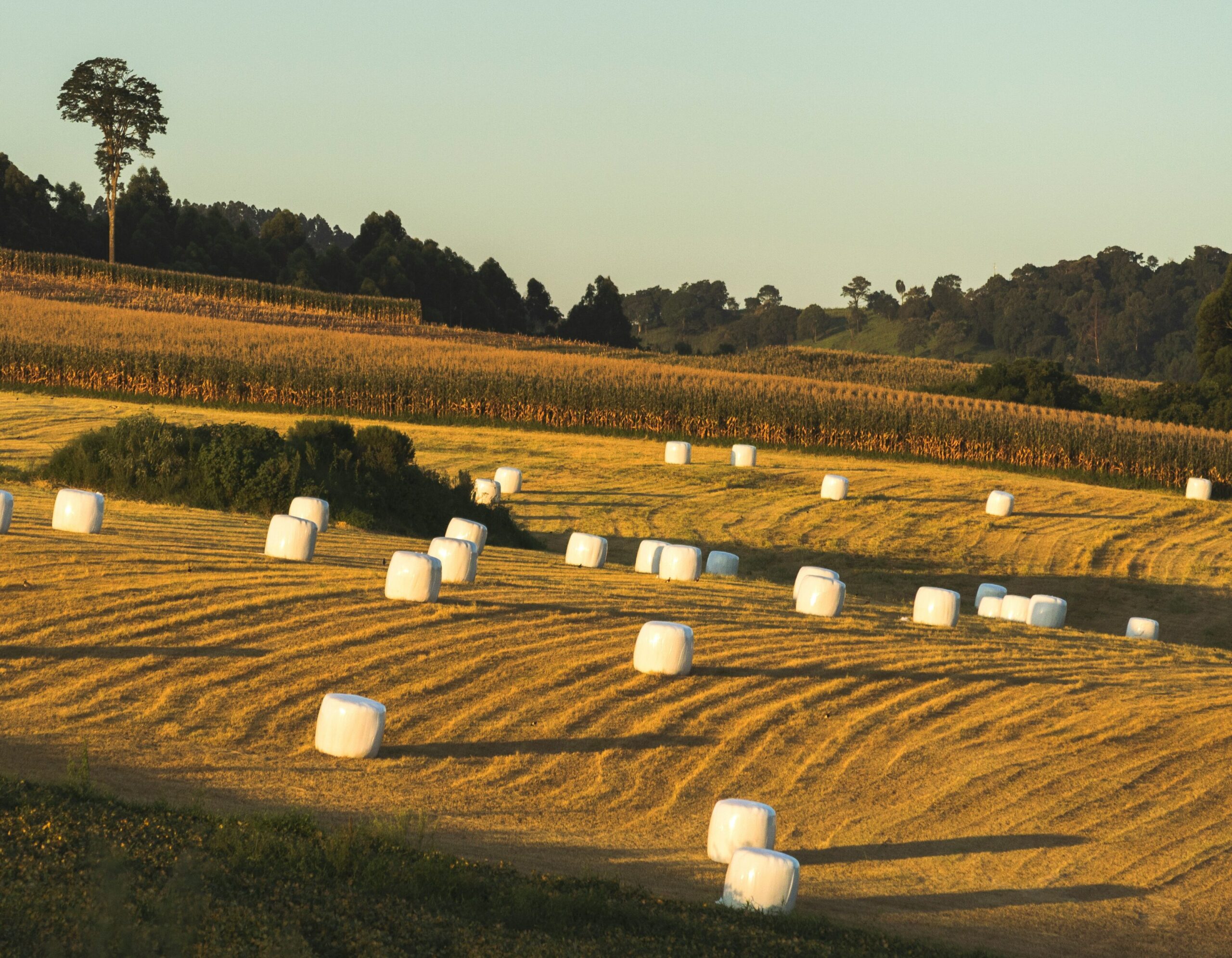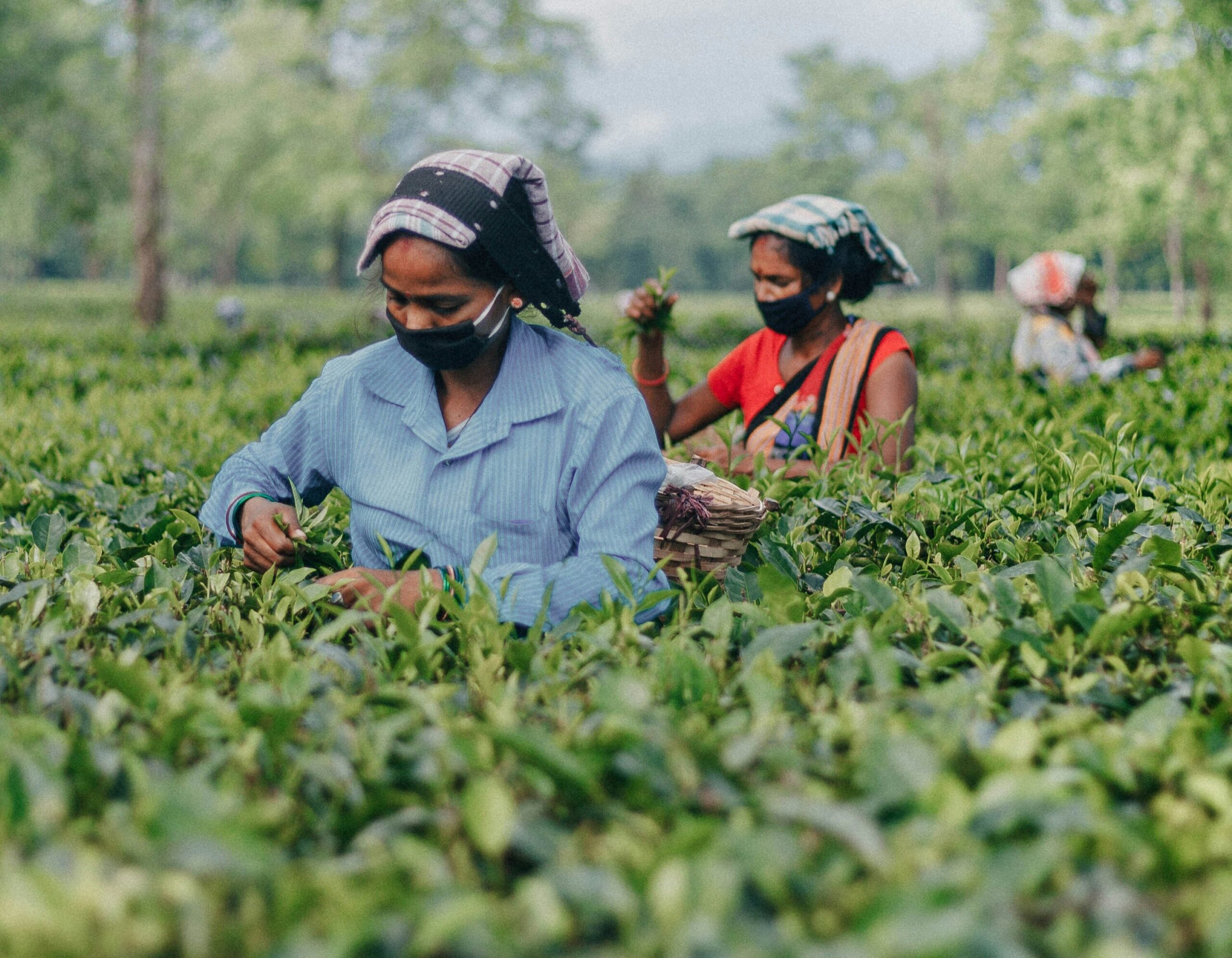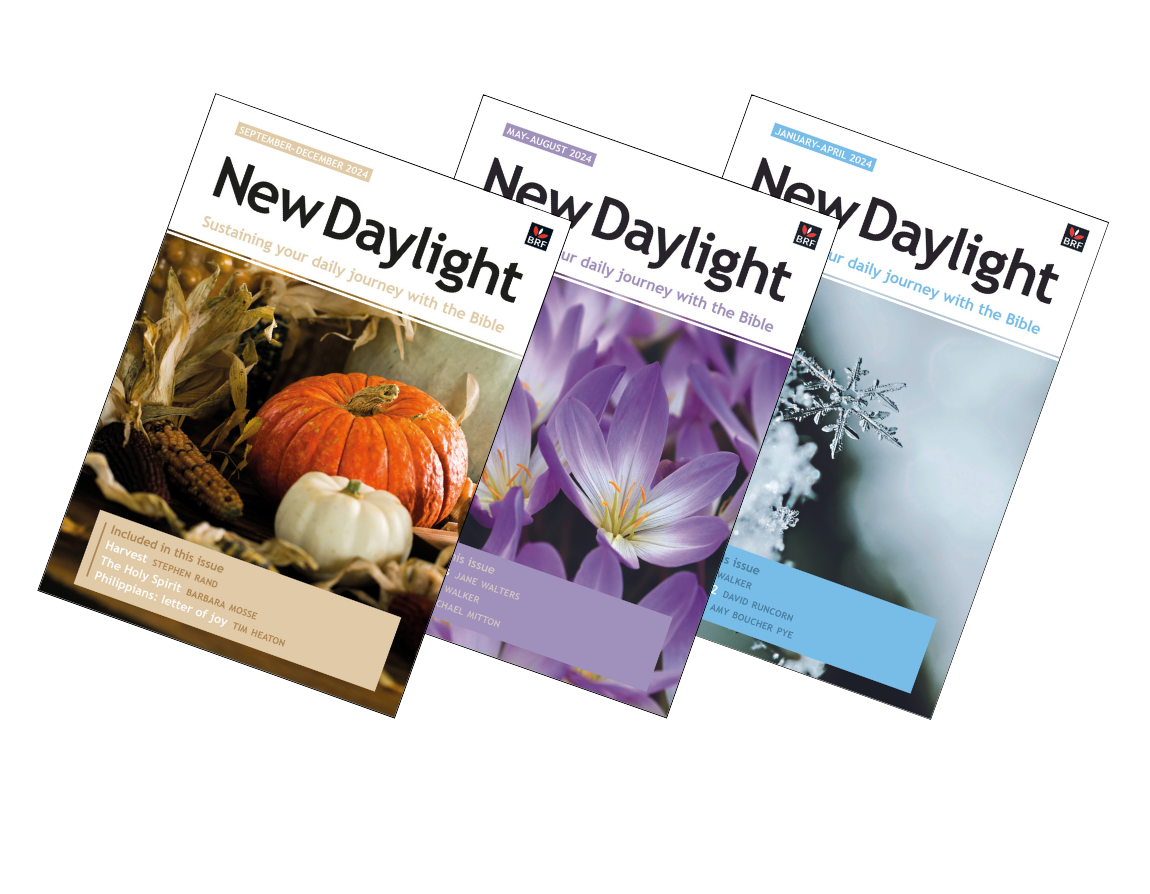Our summer series drawn from the September 2024 issues of our Bible reading notes concludes with Stephen Rand’s reflections on Harvest in New Daylight.
25 August 2024
Celebrating harvest
I grew up in Birmingham. I did not know anyone who ploughed the fields and scattered good seed on the land. As I got older I realised someone must be doing it on my behalf – in fact an enormous network of people across the world producing bananas from the Caribbean, coffee from Brazil, strawberries from Kent – and, of course, chocolate from Bournville, just down the road! All fed and watered by God’s almighty hand.
Then I began work with Tearfund. Year after year I produced resources for harvest festivals. I discovered that most churches celebrated Harvest on the last Sunday in September, earlier in Scotland because the harvest is earlier.
And as I travelled to gather information for these harvest festival resources, I came face-to-face with people whose harvest had been destroyed by drought. I squatted in the dust beside a church elder as he gave thanks for a meal that consisted of leaves and berries gathered from the trees and boiled into an unappetising sticky black leafy dollop. Another visit, I woke one morning to hear the cries of wailing lament for those who had died of starvation in the night.
I wonder if you are among the dwindling number who still ‘say grace’ before a meal? I love the fact that it is called ‘grace’. The prosaic reason is that it comes from the Latin word for giving thanks (in Italian, grazie). But it is also a reminder that our food – indeed all that we have, our life and breath – are a gift from God, one that we do not deserve. A short prayer before grasping the knife and fork can be a meaningless habit; it can also be the moment, daily, when we remember our interdependence as a human family and our dependence on a loving God who is worthy of our thanks.
A church Harvest festival can perform the same function in the life of the Christian community. Together we celebrate all the resources that God gives us to sustain our life. And we give thanks.

Our food – indeed all that we have, our life and breath – are a gift from God, one that we do not deserve.
The promise of harvest
The Lord smelled the pleasing aroma and said in his heart: ‘Never again will I curse the ground because of humans, even though every inclination of the human heart is evil from childhood. And never again will I destroy all living creatures, as I have done. As long as the earth endures, seedtime and harvest, cold and heat, summer and winter, day and night will never cease.’
Genesis 8:21–22 (NIV)
Noah’s ark is a great story and a Sunday school staple. The problem is that you have to gloss over the almost total destruction of humankind. It is not easy for a five-year-old to grasp the concept of God’s judgement and mercy; it is perhaps no easier for a 75-year-old.
But now there is the growing evidence of a new threat to the existence of humankind. Floods, heatwaves, droughts: extreme weather events that indicate the reality of global warming and climate change caused by human activity, the burning of fossil fuels. Politicians dither, on the one hand promoting policies in pursuit of net zero, and then terrified that interfering with voters’ driving habits will lose them support in the next election.
God’s promise in Genesis is that he will never again destroy life: seedtime and harvest will never cease. Right now we face the challenge – do we trust God to keep his promise?
When the Israelites were freed from Egypt and travelling in the wilderness, God provided a daily harvest of manna. They were instructed to only take enough for each day. Those who did not trust God to provide the next day and took more than enough discovered that it went rotten: greed stinks.
In 2024 the earth still produces enough food to feed all its eight billion inhabitants: God is keeping his promise. But it is conditional: it is for ‘as long as the earth endures’. God alone knows how long that will be. And the Bible is clear that he alone will decide when it is time for ‘a new heaven and a new earth’. In the meantime, every Christian should be concerned to take care of the planet, of God’s creation, for the sake of the one who made it and for the good of all who share it.

Every Christian should be concerned to take care of God’s creation, for the sake of the one who made it and for the good of all who share it.
Sharing the harvest
When you are harvesting in your field and you overlook a sheaf, do not go back to get it. Leave it for the foreigner, the fatherless and the widow, so that the Lord your God may bless you in all the work of your hands. When you beat the olives from your trees, do not go over the branches a second time. Leave what remains for the foreigner, the fatherless and the widow. When you harvest the grapes in your vineyard, do not go over the vines again. Leave what remains for the foreigner, the fatherless and the widow. Remember that you were slaves in Egypt. That is why I command you to do this.
Deuteronomy 24:19–22
These subsistence farmers had to take care not only of the land, but also of other people, those outside their own family. Throughout the books of the law there are regular mentions of the foreigner, the fatherless and the widow. What links these three very different groups of people? They were those without access to land on which they could grow their own food – they depended on others for their sustenance.
So God insists that the whole agricultural system has to work to include the outsiders and to ensure that no one becomes hungry or destitute. This is a thread woven into the whole fabric of Old Testament law. The specific instruction given in Leviticus 23:22 – ‘When you reap the harvest of your land, do not reap to the very edges of your field or gather the gleanings of your harvest. Leave them for the poor and for the foreigner residing among you’ – is the basis of the story of Ruth, which reveals the generosity and thoughtfulness with which these laws could shape relationships and community.
Some view it as hopelessly romantic and inefficient. Some argue that it was never really worked out in practice. But the basic concern enshrined in God’s instructions still informs Christian action on behalf of the vulnerable. There should be no need for food banks in 2024, but it is no accident that churches are at the heart of this network of care for the needy. Harvests come as a blessing from God, and blessings are given to be shared.

We can hear the cries of those who gather in our crops – and do something about it.
The cries of the harvesters
Now listen, you rich people, weep and wail because of the misery that is coming on you… Look! The wages you failed to pay the workers who mowed your fields are crying out against you. The cries of the harvesters have reached the ears of the Lord Almighty. You have lived on earth in luxury and self-indulgence. You have fattened yourselves in the day of slaughter.
James 5:1–5
It is almost impossible to believe that these angry words are part of the New Testament. It is as if an Old Testament prophet has become a left-wing agitator. I suspect if I shouted these words in a street in the City of London it might not be long before the police arrived.
But as those who have largely benefited from capitalism, it is easy to forget that the Bible consistently reminds us that God is deeply concerned about how wealth is gained and how it is used. And it is easy to forget that poverty itself is the result of the failure to live up to God’s standards: ‘There need be no poor people among you… if only you fully obey the Lord your God and are careful to follow all these commands I am giving you today’ (Deuteronomy 15:4–5).
I once visited an area in Bangladesh that included a British-owned tea estate. Its workers were foreigners who had been moved there under the Raj and were now in effect imprisoned on the estate. They were significantly poorer than the local Bengalis; there was a high incidence of leprosy, a significant sign of poverty. The management of the estate said they could not afford to pay the staff more, as the tea would become too expensive. But I noted that the shareholders were still receiving their annual dividend.
That experience has helped me remain committed to the Fairtrade movement over most of my adult life, campaigning for our church(es) and town to share in that commitment and ensure that the people who grow our food are properly rewarded. And last year the signs went up on all the roads into Bicester, proclaiming it to be a Fairtrade town. We can hear the cries of those who gather in our crops – and do something about it.
Scripture quotations are taken from The Holy Bible, New International Version® Anglicised, NIV® Copyright © 1979, 1984, 2011 by Biblica, Inc.® Used by permission. All rights reserved worldwide.



